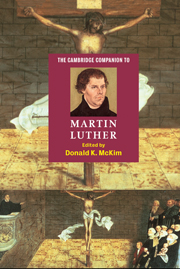Book contents
- Frontmatter
- Part I Luther’s life and context
- Part II Luther’s work
- 3 Luther’s writings
- 4 Luther as Bible translator
- 5 Luther as an interpreter of Holy Scripture
- 6 Luther’s theology
- 7 Luther’s moral theology
- 8 Luther as preacher of the Word of God
- 9 Luther’s spiritual journey
- 10 Luther’s struggle with social-ethical issues
- 11 Luther’s political encounters
- 12 Luther’s polemical controversies
- Part III After Luther
- Part IV Luther today
- Select bibliography
- Index
5 - Luther as an interpreter of Holy Scripture
from Part II - Luther’s work
Published online by Cambridge University Press: 28 May 2006
- Frontmatter
- Part I Luther’s life and context
- Part II Luther’s work
- 3 Luther’s writings
- 4 Luther as Bible translator
- 5 Luther as an interpreter of Holy Scripture
- 6 Luther’s theology
- 7 Luther’s moral theology
- 8 Luther as preacher of the Word of God
- 9 Luther’s spiritual journey
- 10 Luther’s struggle with social-ethical issues
- 11 Luther’s political encounters
- 12 Luther’s polemical controversies
- Part III After Luther
- Part IV Luther today
- Select bibliography
- Index
Summary
THE BIBLE AS A MIRROR OF THE WORLD
The philologist Friedrich Nietzsche maintained that Luther's translation of the Bible was “the best German book.” In connection to Luther's work, Goethe designated the Bible a “mirror of the world” and thereby saw the world of this one book and the “book of the world” enfolded within each other.
Researchers of the German language are to a great extent agreed that Luther, not only with his translation of the Bible but also with his prefaces to the Bible, sermons, Small Catechism, and his songs, pamphlets, and tracts, is an event in the history of German literature to which no other can be compared. The event is of speech that comes out of hearing. Luther is linguistically creative by means of hearing and translating.
To recognize Luther’s significance for the German language, one must not, as has indeed happened, make Luther into the creator of the modern High German literary language. Nevertheless, Klopstock wrote that among no nation has a single person so shaped the language of a whole people as Luther has done. In fact, Luther’s language – above all the language of his translation of the Bible – became the presupposition of understanding and communication throughout the whole of the German language.
- Type
- Chapter
- Information
- The Cambridge Companion to Martin Luther , pp. 73 - 85Publisher: Cambridge University PressPrint publication year: 2003

